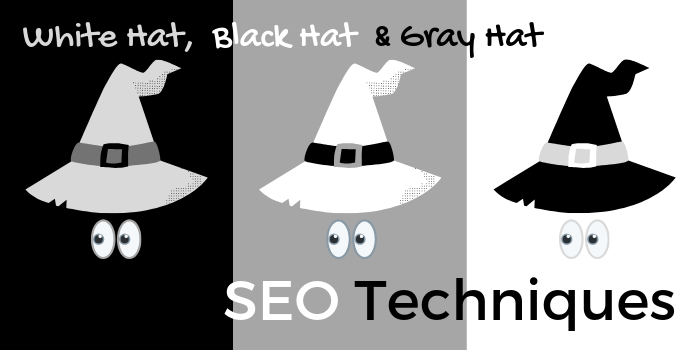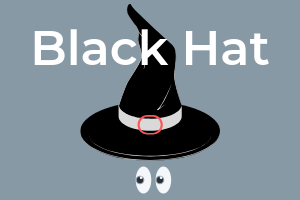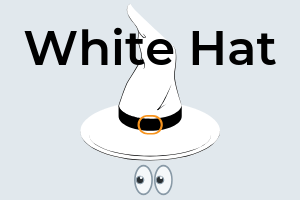What are the differences between white hat, black hat, and gray hat SEO techniques? We all know that they make an impact on your search engine ranking positions, and we also know "white=good, black=bad" is a universally recognized formula. In short,
- White hat SEO - Create a website content genuinely to help users.
- Black hat SEO - Create a website content to mislead users.
- Gray hat SEO - Create a website primarily to rank well in search engines.
"Gray hat" is an interesting one - "don't we all do that?" kind of thing. The technique can help users but often mislead them and, your webpage can risk being penalized by Google if misleading.

What's most important is to avoid black hat marketing techniques if you want to keep your website search engine friendly. And if we define the 'white' next, we'll be able to work out what makes it 'gray'. The terminology is becoming obsolete anyway, nobody will shout out "You are using a gray hat method in your site!"
Black Hat SEO Techniques
Any techniques to deceive users are considered "black hat", so are some tricks to deceive search engines in an attempt to improve rankings. Here are some examples;

#1 Duplicate Content
There are three types of duplicate content;
- Scrape a content that's been created by someone else.
- Duplicate your own content across different domains (different websites).
- Duplicate your own content across different URLs (within the same website).
Search engine crawlers look for unique and original content and when they find copied content, they consider it as a sign of manipulation. So any of the 1-3 can result in negative consequences in terms of your ranking position.
Copying someone else's content can aggregate copyright infringement, and your plagiarized content will be reported to Google by the original creator.
Whereas creating multiple web pages with the same content of your own in an attempt to draw more people's attention is an outdated trick. If you have to have more than one page with the same content for a reason, you should tell Google which page is the canonical version so that all other pages will be crawled less often and considered to be less important.
#2 Article Spinning
You can copy someone else's content, paste it into an article spinner tool and the tool can paraphrase every single sentence for you in seconds. However what the tool does is simply to replace almost every other word with a synonym, so the finished sentence will make no sense.
A spun article may not be detected as 'duplicate' content by search engines, but it will be detected as automatically generated content, which is considered to be a ranking manipulation. Use of an article spinner is a black hat SEO trick - it will not rank, therefore it's meaningless.
To summarize, you just have to take time to create original content from page to page, there's no way around it.
Also Read: Online Article Rewriter. Stupid.
#3 Linking Schemes
Backlinking is only effective when linked by a trustworthy site because it genuinely sees your content as useful. Link exchange services are meaningless because they only list up your page with a link among many others for the sake of linking. Cross-linking with others ("Link to my site and I'll link to yours") is another method that adds zero value, i.e. meaningless.
Any linking services (free or paid) are best to avoid because excessive link exchanges are considered as spam by search engines. While they promise to link your page to "thousands of websites", almost all of them are built especially for the sake of linking.
#4 Spam Comments
Leaving a spam comment with a backlink to your site is a waste of time. For example a comment such as "Wow, your article is great! I'm so impressed. If you want to know more about it, visit https://yoursite.com".
It's a waste of time because such a comment with no quality will likely to be unapproved by the webmaster. If you use a comment bot software, it'll be just blocked automatically.
On the other hand, you should make sure that no spam comment is displayed in your blog posts. If your web hosting service doesn't automatically block spams, you should have a spam-shield plugin installed. If you receive a low-quality comment in such a manner, then at least you should remove the link before you approve it. Because;
- The contributor is likely to be copying and pasting the same message in multiple sites.
- The link destination is likely to be spammy/low quality, and also likely to be shut down not before long, leaving you with a broken link over time.
#5 Misdirecting Users
Purposely redirecting users to an irrelevant page, is a black hat and any of the following methods will hurt your search engine ranking.
- Link cloaking - masking the true URL so that the users will believe that they're browsing your site but they're actually on another site, or vice versa.
- Sneaky redirects / doorway pages - invite users to one page by relevant keywords and automatically redirect them to another page that's irrelevant to what they're looking for.
#6 Invisible Text and Links
Hidden text/links are considered outdated black hat trick, such as;
- Using the white text on a white background.
- Setting the font size to 0.
- Placing a link on one small character, e.g. just on a comma or period.
These are invisible (or almost invisible) to users but search engine bots can still detect them, hence considered misleading.
Any of these can be done accidentally, so you should carefully check the blank spaces and outgoing links within the post before publishing it.
#7 Overused and Irrelevant Keywords
Overusing keywords throughout one page to maximize the visibility ("keyword stuffing") is an old black-hat trick that no longer works - it's simply considered unnatural.
Similarly, the use of irrelevant keywords in an attempt to draw new users' attention, for example "amazing website that Ellen DeGeneres checks every morning". Again, simply inserting the name of a trending topic, popular item or person won't get you anywhere. Because popular keywords are competitve, and mismatching content won't be picked by search engine bots accordingly anyway.
#8 Buying An Old Domain
Buy an expired domain, build up a few pages and place a link back to your main site - it's another outdated trick that no longer works. It worked to some extent in the past because an expired domain has its history, i.e. certain authority level. But the domain content is blank when you purchase it, means it has no quality. It's not worth spending money just for a backlinking purpose.
Should You Never Use Black Hat SEO Techniques?
As the name suggests - Black Hat techniques only violate the search engines' terms of service, so if you rely on search engines to drive organic traffic, you should stay away from these methods to avoid your site being penalized.
White Hat SEO Techniques
Also called "Ethical SEO", White Hat SEO refers to user-focused content creation. The content is listed in search engines naturally because they see it useful. Practices including;

- Using the right keywords - so that users can find the right content.
- Making the site easy to navigate - the menu display, use of H1/H2 tags for headers, space between paragraphs.
- Speeding up the page loading time - by optimizing (reducing the size of) images, using a website builder and theme that's most up-to-date. So that users can view it at ease.
- Quality and lengthy content - so that it's helpful for users.
- With relevant outgoing links - so that the users can be directed to the right information.
Gray Hat SEO Techniques

You go 'gray' when you get the priorities backward because most of us web marketers strive to apply every possible SEO - search engine optimization - technique to get our site ranked in SERP. So that people find it, so that we can help them!
Gray hat SEO can be subjective, because what you try to 'improve' or 'help visitors' can be seen as manipulative if done a little excessively or unnaturally. For example;
#1 Long Tail Keywords
Finding the most relevant long-tail keywords is the key to get ranked in search engines. But it can be a tricky job to incorporate the words into a sentence without sounding unnatural.
For example, "how to improve SEO for WordPress" is a low competition keyphrase. So you need to make up a sentence using that exact phrase, and other sentences to follow. "If you want to know how to improve SEO for WordPress, you're in the right place..."
You often need to construct the whole first paragraph, so that you can use the keywords effectively... Just to get ranked in Google, which is manipulating, hence it can be seen as Gray Hat!
#2 Clickbait
Clickbait is gray because the words are purposely composed to draw the attention of users, which can be misleading but not totally lying, for example;
- "Get a free shopping voucher!" - in fact it's a prize competition so it should be read "Win" a free voucher.
- "Software worth $99 for free!" - in fact it's worth a lot less.
#3 Lead Generation Pages
Landing pages/opt-in pages are not exactly white, because the primary purpose is to get users to take action, not necessarily to "help them" at the point of collecting leads.
#4 Getting Visitors To Stay Long
The longer the visitors stay on your page, the more valuable the page will appear to be in SEO. So we use all sorts of techniques. Add an entertaining value by making the story funny, add a video so that the visitors will stay to watch. Add several interesting internal links to reduce bounce rate, etc. All of which can be seen as manipulations. Then it's not white. But definitely not black - we all do that.
White Hat, Black Hat and Gray Hat SEO Techniques
Never mind the terminology, the main thing is to avoid negative SEO consequences by not using any of the black hat tricks. And be truthful to users. What are your thoughts? Do you know any other unique techniques that work effectively? Leave your comment below.

I appreciate you talking about SEO techniques. Your post provided me with a fresh perspective.
Why? If you are from an SEO agency, why do you think this particular post gives you a “fresh perspective”?
Nice post Ray.
Here’s a thought… all SEO is technically black hat. In its Webmaster Guidelines, Google defines black hat as:
“tricks intended to improve search engine rankings.”
All SEO uses tricks designed to improve search engine rankings… it’s just that some are permitted!
Clearly there are more nefarious black hat techniques that are downright deceptive… but ultimately all SEO, regardless of color, tint or hue, is executed with the same end result as an objective.
Hi Paul, thanks for your comment. I guess that would deny the purpose of defining “black/white hat”? as an SEO is just a way to impress advertising intermediaries (=search engines). Like you dress up smart when you attend a job interview, purely to impress the interviewer regardless of the job type…that would be black hat 🙂
On the other hand, we use some techniques purely for UX, such as optimizing images, making the site mobile responsive, using the right font…all of which also happen to be listed in “SEO techniques”.
Content marketers rely on search engines and the SEO is such an integral part, we just have to know “all the right things to do” I guess. Thanks for sharing your thoughts!
I like the analogy of “dressing up smart for an interview” Ray… that made me chuckle!
Good point about UX too. I agree, of course, that UX improvements should be rewarded by search engines!
Thanks Paul for your comment, I appreciate your valuable thoughts! I wish you all the best!
You are right. It’s ridiculous some people have to define white hat and gray hat SEO’s.
White & gray are things that anyone tries to do to survive digital marketing. These techs are legit. You only have to remember black to avoid getting marked by Google. If you don’t have organic traffic you don’t even have to worry about black techs also.
Hi, thanks for sharing your thoughts. You’re right, as the name suggests – if your traffic source is PPC ads or solo ads, you don’t have to optimize your site for search engines at all.
I am totally inspired by your post. There are so many things that I can learn from you. I had no idea what white/black/gray hat techniques. Now I know which techniques I should or should not use. Thank you very much.
Hi Alice, I’m glad the post is of some help. Any questions don’t hesitate to ask! Thanks for your comment!
Hi Ray, great article. I agree with you on the grey hat SEO. Everyone’s doing it. Let’s face it, the main focus of content marketer is at the end of the day, page 1 of Google search and make money. In order to do that they have to provide quality information that help others and entertain others at the same time.
I also agree that people frequently talk about black hat SEO but less often about the other two. I guess because like you say, the terminology doesn’t matter but all you need to do is to remember what not to do to avoid negative results. Thanks for the inspiring article.
Hi Dex, thanks for your comment. That’s right, we learn these methods in order to be listed in SERP, a lot of which are like advertising techniques. As long as they’re truthful to readers then they’re approved by search engines.